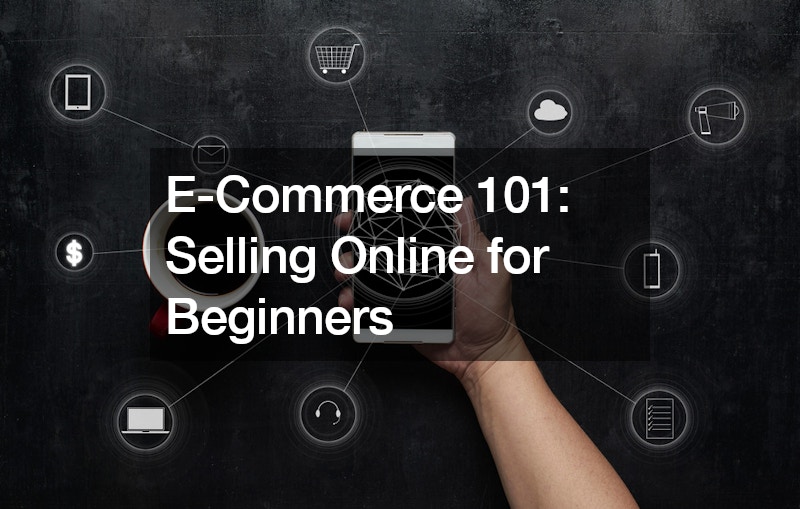
Welcome to E-Commerce 101, your go-to guide for entering the digital marketplace. Wondering how to transform your grand idea into an online selling sensation? You’re not alone. With the e-commerce realm expanding faster than the Marvel Universe, venturing into online sales can feel like stepping into uncharted territory (without a map or a friendly superhero guide). Fear not! We’re here to demystify the process, making selling online for beginners as straightforward as binge-watching your favorite Netflix series. Whether you’re looking to become the next big thing in fashion, tech, or homemade crafts, our guide will walk you through the essential steps, tips, and tricks. Sit back, relax, and get ready to launch your online store faster than you can say ‘add to cart.’

Getting Started with Online Sales
Kicking off your online sales adventure doesn’t have to be a puzzle. Consider what you’re into (maybe drones? They’re pretty awesome) and imagine turning that passion into profit. Selling online for beginners starts with a bang when you pick products you’re passionate about, but don’t forget there’s a market to consider. Do folks want what you’ve got? That’s your first big question.
Now, about getting noticed—SEO is like the GPS for your online store. It guides potential customers right to your doorstep. You’ve gotta weave those keywords into your site like it’s a spell. Not just any words, though. Use the ones that match what your soon-to-be customers type into search bars when they’re hunting for the goodies you’re selling. (Think like a buyer, not a seller. If I wanted a drone, what would I search for?)
Don’t sweat the small stuff, but don’t ignore it either. Budgeting and design matter more than you might think. Dropping a bit of coin on a slick website can work wonders—it’s like dressing your store in its Sunday best. And keeping an eye on your budget? That’s essential. You don’t want to blow all your cash before starting. (Remember, it’s a marathon, not a sprint. Pace yourself.)
Understanding the Basics of E-Commerce
E-commerce isn’t just about selling the trendiest gadgets or fashion items; it’s a gateway for anyone passionate about anything—yes, even something as niche as air compressor parts. Imagine you’re trying to find these parts online. You’d want to hit up a store that pops right after you’ve typed your needs into Google, right? That’s where SEO magic comes into play. It ensures folks looking for what you’ve got can find you without scrolling through results pages. (Who has time for that?)
You might think, ‘I’ve got my products and SEO down, but what’s next?’ Well, your site’s gotta look good—real good. First impressions matter, especially in the online world. If your site looks like it was thrown together quickly, people might bounce faster than you can say ‘sale.’ Spend smart, though. Keeping within budget means you can keep this rodeo going longer (and nobody wants to run out of cash in the middle of the race).
Selling online for beginners means wearing many hats, and sometimes, it feels like you’re trying to juggle while riding a unicycle. But here’s the deal: once you get the hang of it—understanding your audience, getting that SEO in line, making your website look sharp, and keeping an eye on the budget—you’re well on your way. Remember, even the pros had to start somewhere, and nobody gets it perfect on the first try.
Essential Steps for Selling on the Internet
Now, imagine you’ve got a passion for sewing and sitting on a goldmine of sewing resources that people would love to get their hands on. (Who wouldn’t want a top-notch sewing kit, right?) Getting these goodies in front of the right eyes isn’t just about throwing them online and crossing your fingers. You’ve gotta get smart with SEO. Think about keywords that folks might use when hunting for sewing tools. This way, your site pops up like a friendly neighborhood sewing shop when someone desperately needs that perfect sewing needle.
But here’s a curveball for you. When selling online for beginners, getting caught up in making everything look perfect is easy. Sure, you want a site that’s as sleek as your sewing scissors, but don’t blow all your budget on fancy web design. (Trust me, those funds can stretch further than you think.) Keep it simple yet attractive, and focus on what matters—making it easy for your customers to find and love your sewing resources.
You don’t wanna forget about the dough. Selling online means keeping a keen eye on your expenses. Don’t just spend willy-nilly; be smart about it. (Because you’re here to make a profit, right?) Keep track of what’s going in and out, and always look for ways to do things more efficiently.

Navigating the World of Online Selling
Entering the world of online selling can feel like navigating a dense jungle, especially for beginners. (After all, it’s not just about putting stuff up on a website and hoping for the best.) You’ve got to be strategic about what you’re selling, whether it’s sewing kits or even something as niche as an animal ultrasound machine. Keywords are your compass here. Think about what your potential customers are typing into Google. (For example, ‘How to deliver baby goats’ could lead them to that ultrasound machine you’re selling.)
Now, keeping an eye on your budget is more important than ever. (We’re talking make-or-break-your-dream important.) It’s tempting to splash out on a website that looks as slick as a newly oiled sewing machine. Instead, ask yourself where every dollar’s going. Could it be better spent on marketing, or maybe stock? Remember, every penny should help you get closer to your goal.
Design is another puzzle. You want your online space to look good, but it must also be easy to use. A cluttered website can drive customers away faster than a sale on Black Friday. Keep it simple, attractive, and, above all, user-friendly. Your site should invite customers in, make them feel at home, and, ideally, get them excited about what you’re selling.
Beginner’s Guide to Launching Your E-Commerce Business
Firstly, starting an e-commerce venture means you’ve gotta get your product choices right. Suppose you’re eyeing the niche of water supplies—everything from filters to fancy, eco-friendly bottles. You’ve got to think, ‘Who’s gonna buy this?’ and ‘Why would they choose me?’ But here’s the trick: figuring out the perfect angle to make your supplies the go-to for folks wanting hydration solutions that are a cut above the usual.
When selling online for beginners, keeping an eye on the SEO game is crucial. You’re not just throwing products up and hoping for magic; you’re playing a smart chess game with keywords. Consider it like this: if someone’s desperately searching for ‘the best way to stay hydrated,’ your site needs to pop up as the oasis in the desert. And yes, that means getting dirty with SEO strategies that might seem a tad overwhelming initially.
Don’t blow your budget on flashy things before you’ve made your first sale. Yeah, we all want that sleek website that screams ‘buy from me,’ but if there’s no cash left for marketing or, you know, more stock, then you’re gonna hit a wall. Keep it lean, focus on getting those first sales through the door, and then (only then) think about sprucing things up.
Key Elements of Selling Products Online
When you’re knee-deep in selling online for beginners, getting your product lineup is like finding a needle in a haystack. Say you’re leaning towards something niche, like firearm sales. (It’s not everyone’s cup of tea, but stick with me.) You’ve gotta zone in on who wants what you’re selling and why they’d pick you over the other guy. It’s all about standing out; that’s no small feat in a sea of competitors.
Then, there’s the whole SEO dance you’ve gotta do. It’s like trying to make your way through a crowded party, aiming to be the most interesting person in the room. If you’re playing in the big leagues, like selling outdoor gear or tech gadgets, popping up on the first page of Google is a game-changer. You need to be where the action is, and that means playing nice with keywords (think ‘best waterproof tent’ or ‘latest tech gadgets’) without making it look like you tried too hard.
Budgeting and design might not sound like the most thrilling part of the gig, but hear me out; they can make or break your e-commerce dream. You don’t wanna blow all your cash on a fancy website only to find out you’ve got no budget left for ads or stocking up on the cool stuff you’re selling. Keep it simple at the start, focus on what’s necessary (like making sure your site doesn’t look like it’s from the ’90s), and invest in areas that’ll drive sales.

Introduction to Online Retail for Newbies
Diving into the world of online retail can feel like stepping into a whole new universe, especially if you’re just starting out. Imagine you’re looking into something specific, like gun sales. Sure, it’s a niche market, but it’s also one where you’ve got to know your stuff (and your customers) inside and out.
Now, selling online for beginners isn’t just about listing your stuff and calling it a day. (If only it were that easy, right?) You’ve got to get savvy with SEO. Picture this: your online shop’s the newest coffee spot on the block, but no one will stop by if they don’t know you exist. That’s where keywords come into play. You wouldn’t want to be whispering into the void, hoping someone hears about your ‘latest tech gadgets.’
Let’s chat about keeping things looking sharp without breaking the bank. You might think you need a website that looks straight out of a Silicon Valley startup’s dream, but here’s the thing—you don’t. Keeping things simple but functional is your best bet when dipping your toes into online sales. (No one likes a site that takes a century to load.)
Tips and Tricks for Successful Online Sales
Now, if you’re eyeing a niche like becoming the go-to wholesale seafood supplier in town, you’ve got to play it smart with your SEO. Think of it this way: the ocean’s full of fish, right? But your shop’s the one that’s got to shine brighter than the rest (kind of like finding Nemo among all those clownfish). It’s all about using keywords to hook your customers right in. You don’t want to end up being the best-kept secret in town.
Regarding budgeting, remember, it’s not just about keeping the lights on. It’s like planning a road trip; you’ve gotta have enough gas to get you there and some extra for the unexpected detours (because selling online for beginners often takes a few). Allocate funds for those ads that’ll get you noticed and maybe some sweet deals that’ll keep your customers coming back for more.
And hey, about your website design, you don’t need all the bells and whistles to make a splash. Keep it clean, easy to navigate, and mobile-friendly (because who isn’t shopping on their phone?). Remember, a slick website might catch their eye, but the smooth sailing (aka user experience) will keep them around.
Exploring the Opportunities of E-Commerce
E-commerce isn’t just about selling the trendiest gadgets or fashionable attire; there’s a whole world out there for more niche markets. Take rebar products, for example. You might think, ‘Who’d look for those online?’ but you’d be surprised at how many contractors and DIY enthusiasts search for these materials daily.
Knowing your audience’s needs can make or break your venture when selling online for beginners. It’s not enough to list your products and hope for the best. You must determine what makes your products stand out and then use SEO to guide those specific customers to your doorstep. And when it comes to budgeting, don’t throw all your eggs in one basket. Dabble here and there, making sure you’re visible on social media and maybe even trying out some Google ads.
Now, keep that website design as straightforward as the rebar itself. Ensure it’s so user-friendly that even your grandma can order without calling you for help. (And yes, making it pretty counts, too, but don’t go overboard.) Remember, whether they’re scrolling through on a laptop or tapping away on a smartphone, your customers want that smooth, hassle-free experience almost as much as they want those quality rebars.

Beginner-Friendly Strategies for Selling Online
Tapping into the seasonal barbecue grills market can be a hot opportunity when selling online for beginners. (Everyone loves a good barbecue, right?) Like with those niche rebars, it’s all about knowing who’s hunting for your goods—in this case, those looking to elevate their backyard chef game. And, while you’re at it, make sure you’re stirring in some flavorful SEO strategies; think mouth-watering keywords that’ll get the BBQ enthusiasts drooling their way to your site.
Budgeting is another ingredient you can’t ignore, especially when starting. It’s tempting to pour a big chunk of your cash into one area, say, ads or a flashy website, but let’s spread that dough thinner. You’ll want to invest everywhere (including social media), ensuring you’re visible no matter where your potential customers hang out.
Now, about making your site as inviting as a backyard BBQ—keep it straightforward. There is something to be said for a website design that’s as user-friendly as flipping burgers on the grill: easy, hassle-free, and maybe a little fun. And that’s the secret sauce to selling online for beginners—you’re making it as easy as pie for customers to find (and fall in love with) your BBQ grills.
In wrapping up our crash course on E-Commerce 101, it’s clear that selling online for beginners doesn’t have to be daunting. (Who knew turning those grill-loving folks into customers could be as fun as a backyard BBQ?) Remember, it’s all about keeping it simple, engaging, and accessible—because at the end of the day, everyone’s just looking for a good time and a great product.



